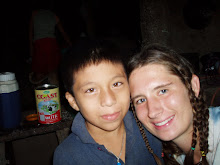This time a year ago I was leaving El Salvador, unsure if I would ever return to the country that changed my life. Last summer, I had the opportunity to intern with the non-profit FUNDAHMER and live with a family for 10 weeks in the community Los Naranjos. The "plan" was for me to help with a sustainable agriculture project they were starting called "Centro Agroecologico," but I soon realized that I was of very little help. I knew nothing about tropical agriculture and I was not accustomed to working in the hot tropical sun (and thus I was always slow and tired). However, I went to learn and I definitely accomplished that. I learned a lot about the Salvadoran life and people. I caught glimpses of the Salvadoran reality - which was very different than the reality I lived back in the States. Before going I could quote you all the statistics about poverty and inequality and deforestation, but I knew nothing about the people living in poverty. The people affected by the deforestation.
I still cannot truly say that I know what it is like to live in poverty because I always had the option to leave, and part of poverty is not having options. But I do think I got a snapshot of their life and their struggles. A life that is hard, but beautiful. A life that seems to be without mercy, yet the people are full of mercy. A reality that made me question whether God is truly a loving God, yet it was the people living this reality that taught me how to love...
And thus when I found myself in the plane looking down at El Salvador, I realized I left something behind. A part of me would always belong to the children I last saw running behind the pickup yelling "Adios Angelita, no nos olvidaremos" (Goodbye Angelita, Don't forget us).
When I returned to the states and began dealing with a good deal of culture shock, I also found myself asking a lot of questions about the world we live in and the inequalities that we see everyday (but most of us have learned to ignore). Through asking these questions, I realized that I needed and wanted to return to El Salvador. I wanted to fulfill my promises to come back and I wanted to give back to the people that taught me so much. I had to do something to help (in some small way) create a better world.
With the help of a Compton Mentor Fellowship, I am returning to El Salvador for a year to work on a project in sustainable agriculture and community development. For my project I will be living with the same community, Los Naranjos, that I lived with last summer. I will begin by just going into the community, and by living with them trying to understand their needs, hopes, and challenges. My hope is to bring the community together and to listen to their needs and desires and address the community-based concerns, as well as the ecological needs of the area. Then provide the community with the resources and training needed to become a sustainable agriculture cooperative. A focal point of this goal is to obtain organic certification. This will allow the community to sell its produce at much higher profit margins in the organic markets, and will thus ensure a more sustainable income for the farmers. Hopefully, this, along with other sustainable agriculture techniques, will reduce deforestation by decreasing the need to clear more farmland. As most of us know, deforestation is a real and growing problem, but the poor are not going to understand the importance of preserving the environment (and the rest of us cannot ask them to) until they can be assured of their next meal. Thus it is necessary to address the full range of problems associated with sustainability and search for a solution that is socially, economically, and ecologically sustainable. My hope is to work with the community and together work to find solutions that are truly sustainable.

